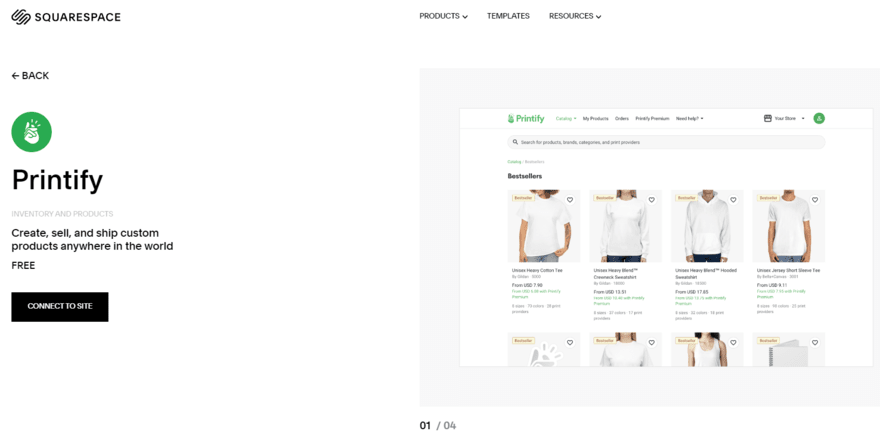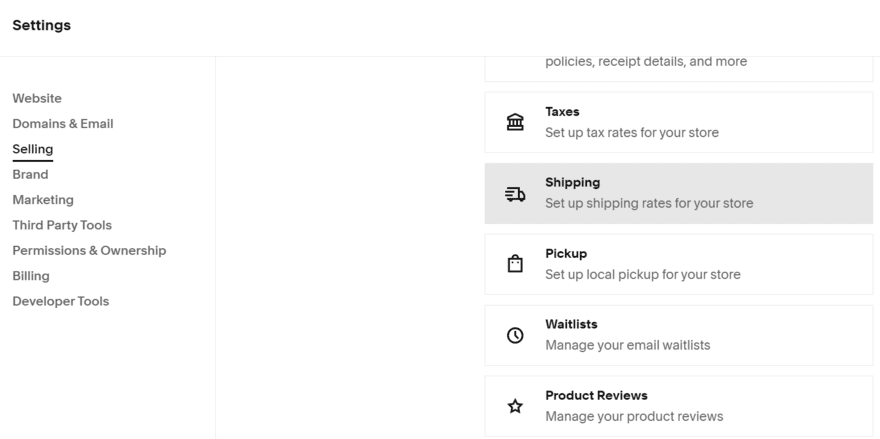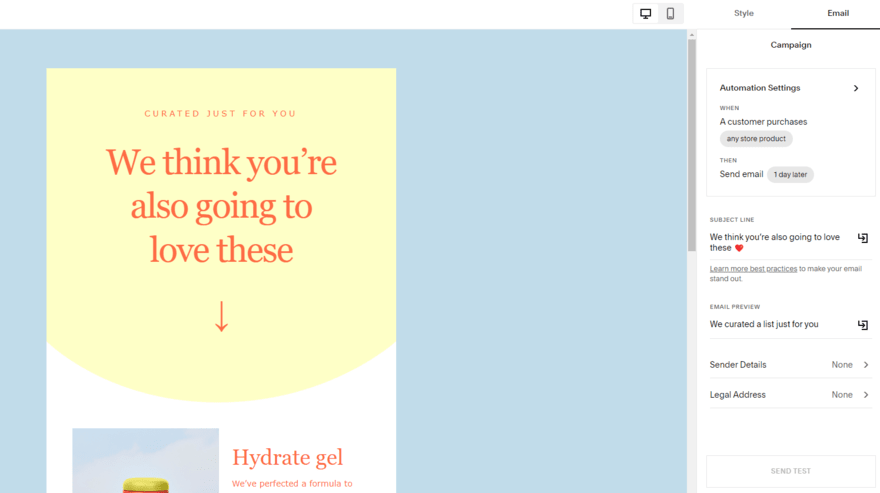How To Dropship on Squarespace in 2024: Everything You Need To Know
If you click to purchase a product or service based on our independent recommendations and impartial reviews, we may receive a commission. Learn more
Not only is Squarespace one of our top-rated ecommerce website builders for 2024, but it’s also a great choice if you’re looking to start a dropshipping business. Squarespace offers several third-party dropshipping integrations, helping you sell products to customers without worrying about inventory management or delivery.
In this guide to dropshipping on Squarespace, I’ll walk you through all the steps, including choosing a dropshipping supplier, setting shipping rules, and managing your customer relationships.
Dropshipping on Squarespace: Pros & Cons
If you’re still on the fence about dropshipping on Squarespace, I’ve summarized the key benefits and downsides of this selling method:
Pros
✔️ Squarespace offers multiple third-party extensions to choose from, including popular dropshipping providers like Spocket
✔️ You don’t need to worry about storing products, meaning you can manage your Squarespace store from anywhere without being tied down to handle orders in person
✔️ Squarespace has built-in ecommerce features to help support your dropshipping business, such as limited availability labels and advanced shipping
✔️ Manage your pricing and product information in the Squarespace dashboard, making it easy to edit what customers see
✔️ Market your dropshipping products using Squarespace’s social media tools, Email Campaigns feature, and more
Cons
❌ Squarespace lets you connect your site to 10 dropshipping apps, but other builders, like Shopify, offer lots more
❌ Squarespace doesn’t offer built-in dropshipping features, so you’ll need to make separate accounts with your chosen dropshipping suppliers
❌ You can’t connect with DSers-AliExpress through Squarespace Extensions which is a popular dropshipping supplier available through other builders, like Wix and Shopify
#1. Build an Online Store With Squarespace
To begin dropshipping on Squarespace, you must build an online store using the website builder. Thankfully, Squarespace is the easiest website builder we tested, relying on a drag-and-drop editor and a library of stunning templates to bring businesses to life.
At this point, you’ll likely have already set up your website and so know how to use Squarespace, but here’s a quick recap of the steps to make sure you haven’t missed anything essential:
- Choose a pricing plan – Squarespace’s ecommerce plans range from $23 to $52 per month (billed annually)
- Pick a template for your store – I could filter Squarespace’s template library by business type, such as “Photography” or “Professional Services”, to find the right look
- Set up payments – ensure you can accept payments from customers by setting up Squarespace’s native payment gateway, Squarespace Payments, or a payment processor, such as PayPal
- Prepare your products – sync your dropshipping products with your Squarespace account
- Establish shipping options – set your rates and shipping rules (I’ll discuss this in more detail later)
- Publish your store – share and promote your live website to get your products in front of customers

#2. Choose a Dropshipping Method
Popular website builders, like Wix and Squarespace, don’t provide dropshipping capabilities as a built-in feature. Instead, you’ll need to integrate your site with a specialist dropshipping platform.
Squarespace offers a range of dropshipping apps with Squarespace Extensions, the builder’s app market, to help you start a dropshipping business. These include:
- Art of Where
- Printful
- Printify
- Printique
- Order Desk
- ShipBob
- ShipStation
- Spocket
- SPOD
- Syncee
These dropshipping apps simplify the process of syncing products to your website. Besides this, your app of choice will determine the suppliers you use, the quality of your products, and the shipping times for your customers.
I recommend deciding which types of products you want to sell ahead of time – having this information to hand, and understanding your target audience, will help you choose a suitable supplier.
To install your chosen app, click to connect it to your Squarespace store, and set up an account with the dropshipping platform. Once that’s completed, you can select and customize your products, set competitive pricing, and import your inventory to Squarespace.

How Much Does a Dropshipping Extension Cost?
Pricing will depend on the app you choose from Squarespace Extensions, but there are two common pricing models.
- Premium subscriptions – for example, Spocket plans begin from $24.99 per month, and ShipStation plans start from $9.99 per month (these are additional fees on top of your main Squarespace website subscription)
- Free apps with additional costs – for example, Printful won’t cost you a cent until your business receives orders, at which point you’ll need to cover manufacturing costs and shipping
#3. Set Shipping Rules
While your dropshipping app will handle stock and manage the delivery process, you must determine shipping rules and rates with Squarespace. Shipping is an additional cost to consider, and your dropshipping supplier won’t cover these fees for your business. Because of this, I recommend factoring in shipping costs when setting product pricing.
Under Squarespace’s “Shipping” panel in the settings, you can edit your shipping rules for countries, states, and cities to create shipping zones. You can also set shipping options, such as flat rate shipping or carrier-calculated shipping.

#4. Market Your Dropshipping Products
It’s important to consider your marketing strategy to generate sales and boost interest toward your dropshipping products. After all, the market can be tough when multiple businesses are selling the same products.
Here are my top tips to help your Squarespace website and dropshipping products stand out:
- Deliver consistent branding – create a cohesive product catalog and store concept by tying everything together with a strong tone of voice and brand assets
- Create email marketing campaigns – use Squarespace Email Campaigns to generate newsletters and promotional campaigns to engage with loyal customers and potential shoppers
- Diversify your marketing channels – connect your social media accounts to your website and generate content to reach your audience on platforms that they’re already visiting and shopping on
- Optimize your website – consider SEO basics and optimize your products with keywords and metadata to help them get found on search engines

#5. Manage Your Customer Relationships
When your business uses a dropshipping app as a middle-man for selling products, you must be extra diligent about customer relationships and the overall customer experience.
For example, a customer might leave an angry comment in a product review, or there might be an issue with fulfilling an order due to the supplier running out of stock. Whatever the issue, it’s your responsibility as the business owner to listen to your customers and maintain those relationships, even if it means taking the time to respond to negative reviews.
Be open and transparent about your dropshipping process so customers know what to expect when shopping with your business.
I also recommend keeping an eye on your orders and product availability, even if that’s not handled in-house, so that you can remain aware of any potential hiccups. Most dropshipping apps will automatically update stock information, and you can set up limited availability labels on Squarespace to alert customers to low stock. If you’re prepared, dealing with disgruntled customers will be easier.
Other Dropshipping Considerations
Dropshipping is a convenient ecommerce model, especially if you don’t want to invest in warehouse space or have the time to handle the shipping logistics. Still, there are several things you’ll need to do when setting up this type of business:
- Choose a business structure – such as sole proprietorship, limited liability company, or corporation
- Apply for an Employer Identification Number (EIN) – you can request this from the IRS, allowing your business to pay taxes, connect with dropshipping suppliers, and separate your business finances
- Register your business name legally to protect your brand identity
The steps above apply to a US business. If you’re outside the US, you must check with your local government to ensure you follow the necessary steps and requirements.
How To Dropship on Squarespace: Summary
At this point, you should have a good understanding of how to dropship on Squarespace. As a reminder, you’ll need to:
- Build an online store with Squarespace so you can sell products and accept payments
- Choose a dropshipping platform, such as Spocket, from Squarespace Extensions
- Determine shipping rules for your products that make sense for your business and customers
- Market your dropshipping products through email campaigns and social media to encourage sales
- Manage your customer relationships to ensure positive shopping experiences
Dropshipping is a great way to dip your toes into the world of selling online, but you can read our list of dropshipping tips for more expert advice to help you get started.

2 comments